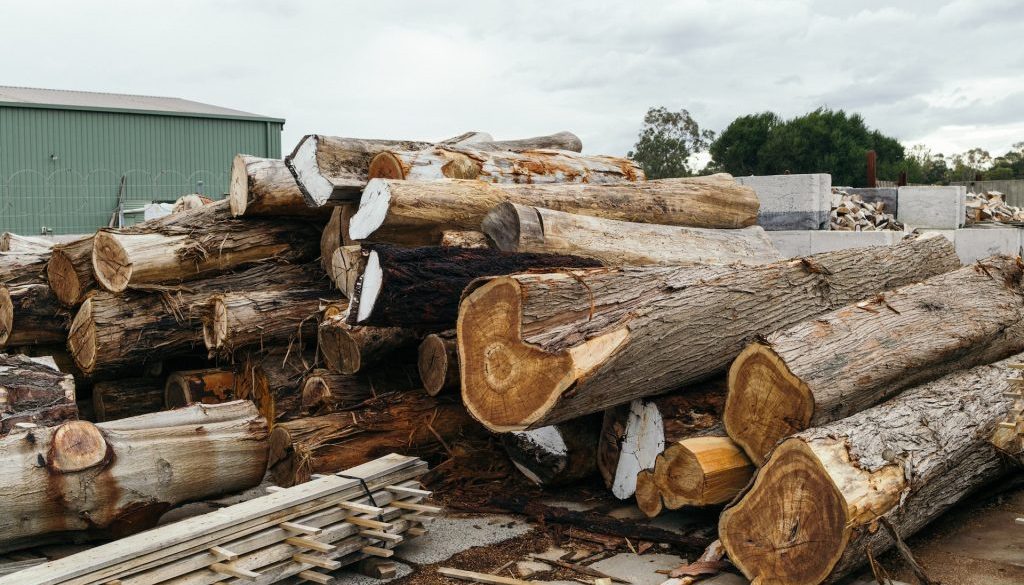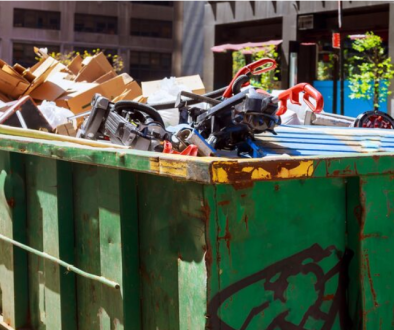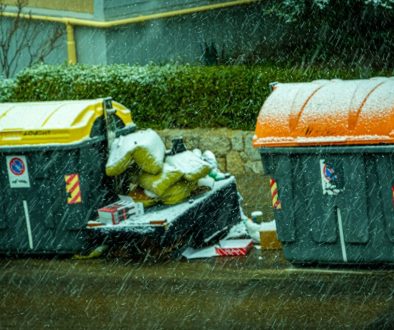Any landscaping or home renovation project will inevitably create waste, making it crucial to include waste disposal as part of the construction process. An organised construction site helps you work faster, more efficiently and safely, especially if the project is big enough to warrant the use of a skip.
What Are Skips?
A skip is a large metal container used to collect and dispose of waste from construction or landscaping sites. They are available in various sizes, from small 2-yard skips to large 40-yard skips, and they can be hired for varying durations, generally between 1 and 2 weeks. Skips are ideal for getting rid of large amounts of waste, such as soil, rubble, bricks, wood, and other construction materials. They can also collect recyclable materials, such as cardboard and paper.
Skips are typically delivered to the construction site by a local skip hire company and then collected when the skip is full. The company will then responsibly dispose of the waste. This is often more convenient and cost-effective than hiring a waste removal company, as the local skip hire company will take care of all the waste disposal needs.
Things to Consider for Skip Placement
The bigger your project is, the more crucial skip placement can be. A well-placed skip will allow workers and equipment to move around freely while still being in a convenient spot that decreases effort during clean-up. You should consider three things when deciding where to place your skips.
1. Accessibility
It is important to ensure that you place the skip in an easily accessible area so that it can be filled and emptied quickly and efficiently. If the skip stays in a difficult-to-reach location, it could cause delays and extra costs.
2. Safety
Safety is paramount when it comes to placing a skip. It is vital to ensure that the skip is placed in a safe area, away from potential hazards such as traffic, pedestrians, and buildings.
3. Size
You should carefully consider the size of any skip that you hire to ensure that it is suitable for the amount of waste that needs to be collected. If the skip is too small, it could lead to delays and extra costs as it will need to be emptied more frequently.
If you’re unsure about proper placement, consult your local skip hire provider as they will have enough experience to decide on the most optimal placement for your construction zone.
How to Choose the Best Location to Place Your Skips
The best location to place a skip will vary, depending on your construction site. Follow these three tips to determine the best location to place your skips.
1. Look for the Flattest Area Possible
If at all possible, it is best to place the skip on a flat, level surface. This will make filling and emptying easier and also reduce the risk of damage to the skip or any nearby property. If your construction site is in a sloped location, place the skip on the flattest area possible. This will help prevent any waste from spilling out and reduce the risk of the skip tipping over.
2. Keep It Away, But Visible from Public Areas
If the construction site is in a public area, place the skip at least two metres away from any public walkways or roads. Placing skips away from public walkways or roads helps keep pedestrians safe from flying debris and any health risks that may arise. However, the skip should still be visible to the public, as this will help to reduce the risk of fly tipping.
3. Provide Enough Manoeuvering Space for the Skip Lorry
The whole point of a skip is to make waste disposal easier by having a lorry drop it off and collect it for you. For this reason, ensure you have enough space for the lorry to come in and out of the construction zone. For homeowners, this usually means the front garden or the driveway. If you are working in a commercial location, this may mean closing off a car park to make way for the skip.
Be sure to keep the skip parallel to the pavement. No portion of it should jut out to the road for safety. Some areas may require a special permit from the local authority before placing the skip on a public highway, so be sure to always check with your skip hire provider if this is indeed the case.
4. Avoid the Utilities
Skips are great for managing waste during a construction or large-scale project. But it’s important to remember that when placing a skip, you need to consider the possibility of interfering with utility supplies and drains. Make sure your skip placement doesn’t block water drainage points. This is especially important during rainy times of the year when blocked drains can cause flooding.
Consider also whether your skip bin placement could prevent utility companies from accessing power lines and poles. Look for fire hydrants as well and see if you’re blocking any. If this is the case, you may need to find an alternate location for the skip.
5. Don’t Block Off Your Neighbours
Be respectful of your neighbours when placing a skip. Ensure the skip is not in the way of anyone’s daily routines. If you live in a cul-de-sac, it is a good idea to let your neighbours know before placing a skip in the area.
Do You Need a Permit to Use a Skip?
You will not need a permit to place a skip on your own property, however, skip permits are required for anyone who wishes to place a skip on public land. This is to ensure that the skip is safely positioned and will not cause any disruption to the public. The skip permits are issued by the local council and must be obtained before placing the skip. The permits will usually last for a set period of time, and the cost will depend on the size and type of skip being used. Failure to obtain a skip permit can result in fines or other penalties.
Conclusion
Skip placement is an essential part of any waste management plan. It is crucial to consider the safety of people and the environment nearby when deciding where to place your skip. By following the tips above, you can ensure that your skip is placed in the most effective, efficient and safe manner possible.
Enviro Skip Hire are a family owned local skip hire provider covering Staffordshire and Cheshire. Apart from our skip hire services, we also offer aggregates and recycling services. Contact us today to learn more.




